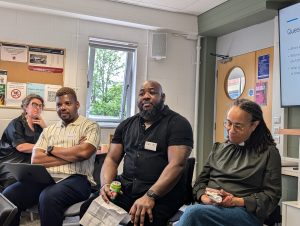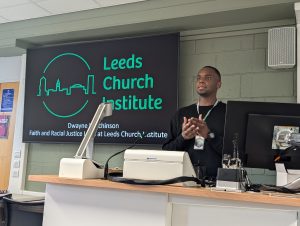
Kathy Shaw from SPARK Social Justice reflects on the Reclaiming Histories day conference, hosted on 5th June 2025 by Leeds Church Institute and USPG. This reflection was originally published on the Diocese of Leeds Justice and Peace Commission website.
Aims:
The event aimed to promote deeper learning and discussion about racism within churches, considering the impact of the transatlantic slave trade and the contemporary context of the Black Lives Matter movement.
History and Legacy
The documentary film “After the Flood” shown at the start of the day explored the history of slavery specifically focussed on the transatlantic slave trade, the neglect of slavery in British Christian history and the lasting impact on attitudes about race today. The film explored biblical justifications used to support slavery and the concept of whiteness, looking at how this influenced racism and the need for reconciliation today. Some interesting historical facts emerged, such as how the laws in Barbados replaced Christian to white which became a legal status to justify the enslavement of Africans and their descendants. Missionary work was politically desirable, and slavery was seen to be sanctioned and justified by the Bible. Being pro slavery was a natural part of society, but people wanted it to be more acceptable. Reformers initially wanted a more Christian version of slavery, not to seek their freedom but to make slaves more compliant, a system that required reforming not abolishing.
The missionary arm of the Church of England, the Society for the Propagation of the Christian Religion in Foreign Parts (SPG), inherited three sugar estates in the Caribbean. The plantation was run for the Church by professional planters, but its profits went to the missionary group. Slaves working on the estate were branded on their chests with the word “society”. In the 18th Century, Britain was responsible for over 2.5 million of the 6 million slaves transported. Of these slaves that British slave traders bought or sold, around 300,000 did not survive the journey across the Atlantic.
 The Slavery Abolition Act of 1833 outlawed slavery within the British Empire, emancipating over 800,000 enslaved Africans. However, this abolition was achieved through a compromise: the British government agreed to compensate slave owners for the loss of their “property” (enslaved people). In 1834 a sum of £20 million (approximately £1,958 million in 2022 prices) was allocated for this purpose, and payments were made to slave owners.
The Slavery Abolition Act of 1833 outlawed slavery within the British Empire, emancipating over 800,000 enslaved Africans. However, this abolition was achieved through a compromise: the British government agreed to compensate slave owners for the loss of their “property” (enslaved people). In 1834 a sum of £20 million (approximately £1,958 million in 2022 prices) was allocated for this purpose, and payments were made to slave owners.
This still did not bring freedom but a brutal system of ownership where slaves became low waged apprentices, legally free but having to work two thirds of the week for their former slave owner. If they left the plantation they could be imprisoned.
A legacy of unjust systems and disadvantage continues; institutional racism, lack of representation and inclusion. This was a continuing theme in small group discussions and a well informed plenary panel and asking the question of how a black Christian makes sense of the white narrative which was used to justify slavery. An uncomfortable truth emerges when the history of Christian slavery is explored in terms of unlearning racism to identify who still has the power and continues to benefit.
In a debate in 2006, the General Synod of the Church of England voted to issue an apology for their role in sustaining the slave trade. An apology is part of the process of reconciliation but many British and European firms and their predecessors “drank from the well of Caribbean slavery”, said historian Prof. Sir Hilary Beckles who is vice-chancellor of the University of the West Indies. In 2020 he called on British firms to fund development projects in the Caribbean.
“Unfortunately, one cannot go back and remake the history but you can make atonement: it is not enough to make your apology as a public spectacle, it is not enough to present it as public relations exercise,”
This film is available through the Movement for Justice and Reconciliation who funded the production, more details here https://www.mjr-uk.com/
I felt this film was a starting point for reflection and conversations about unlearning racism within a Church or youth setting, but was a narrative led by white voices. There was a lack of black scholars, academics and activists to lead on these debates and perhaps a missed opportunity to focus on how and when we start to dismantle this legacy. I was left feeling, “and now what?”
Leeds Church Institute
 The afternoon started with Dwayne Hutchinson from LCI introducing the work of Churches Against Racism, a positive, uplifting and well-informed input. Black clergy shared their theological and personal experiences. Black academics presented how faith and race informed their framework of reference. These presentations and contributions from those around the room had a deep and lasting impact. To listen to lived experiences and the pain that is carried through the generations lifted this conference out of the ordinary and into a challenge to think and act differently. It gave SPARK a profile with a largely new group of people and some useful personal contacts were made and will be followed up.
The afternoon started with Dwayne Hutchinson from LCI introducing the work of Churches Against Racism, a positive, uplifting and well-informed input. Black clergy shared their theological and personal experiences. Black academics presented how faith and race informed their framework of reference. These presentations and contributions from those around the room had a deep and lasting impact. To listen to lived experiences and the pain that is carried through the generations lifted this conference out of the ordinary and into a challenge to think and act differently. It gave SPARK a profile with a largely new group of people and some useful personal contacts were made and will be followed up.
Can the State/Church have a prophetic voice if it is part of the establishment? To explore the duality of the secular impact on Christianity a book by Walter Brueggeman “The Prophetic Imagination” was recommended by some attendees.
And Finally!
There were a number of facts I knew intellectually but still resonate with me after the event…
- Indigenous and native people never see themselves as being “discovered” or ask to be offered the truth of Christianity
- Slave owners had the power to order the world and through this lens all the natural resources were harnessed to be productive, but only a select portion of humanity benefitted
- Being a Christian, of any denomination didn’t automatically lead to being an abolitionist or change the material aspects of slave ownership for many generations. Rather, the Bible was used to dehumanise and justify the trade and profits.

